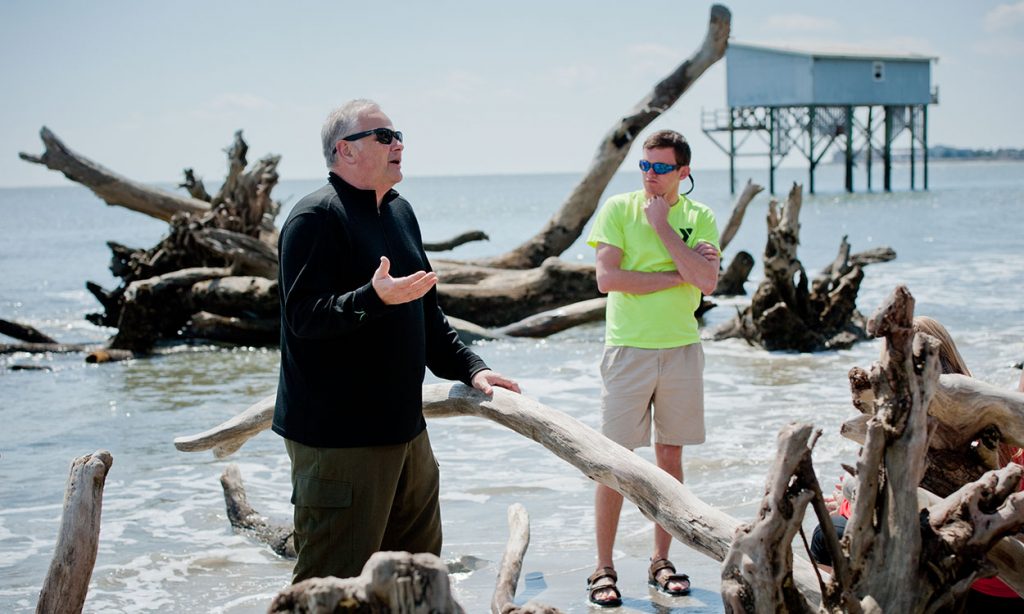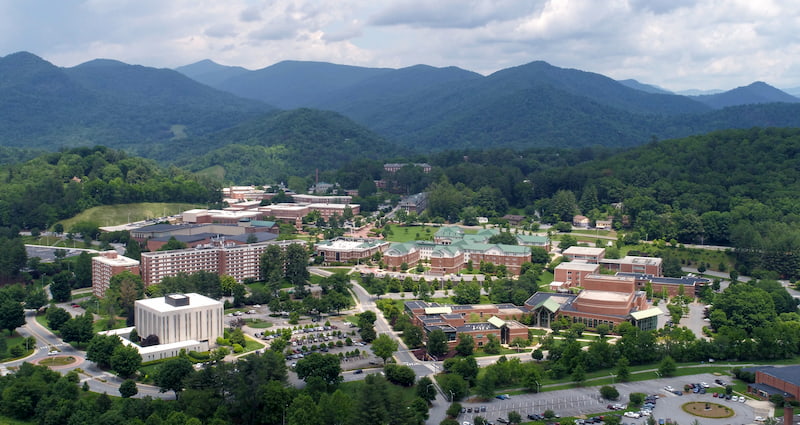CARIBBEAN CATAMOUNTS
Simply put, Western Carolina University’s Jamaica Program, which has been developing teachers as leaders in Jamaican schools for half a century, has become the benchmark of success in educational instruction in that Caribbean country. In the 50 years since WCU’s first involvement there, the program has proven to be a mutually beneficial and effective partnership, enabling thousands of Jamaican educators to improve their teaching skills and, in turn, positively affect the lives of thousands.
This is the Jamaica beyond the idyllic seashores of resorts and the sumptuous buffets of cruise ships, a place where resources are scarce and education has a major impact on poverty and upward mobility. According to a recent World Bank report, crime and violence levels in Jamaica remain high, emphasizing the need to address issues of youth unemployment, social cohesion and, perhaps most importantly, education.
This is where WCU comes into the picture, with four instructional sites located in the neighborhoods of Kingston, Mandeville, Montego Bay and Discovery Bay, in the same areas where the program’s students work. WCU faculty travel individually or in small groups to instruct onsite during the university’s spring and fall breaks, while Jamaica students enrolled in teacher training annually come to Cullowhee for the summer. But there’s more to the exchange program than that.
“WCU’s Jamaica Program has always been connected to the island and to changing the education landscape,” said Dale Carpenter, a professor in WCU’s School of Teaching and Learning who has a longstanding involvement with and commitment to the Jamaica Program. “For example, unlike many international programs that are increasingly delivered online, WCU’s degree programs have involved our faculty traveling to the island and holding classes in the evenings in local schools,” said Carpenter, former dean of the College of Education and Allied Professions. “In addition, WCU faculty are expected to visit other local schools while they’re there to add to their knowledge of the island and add to the relevance of the program.”
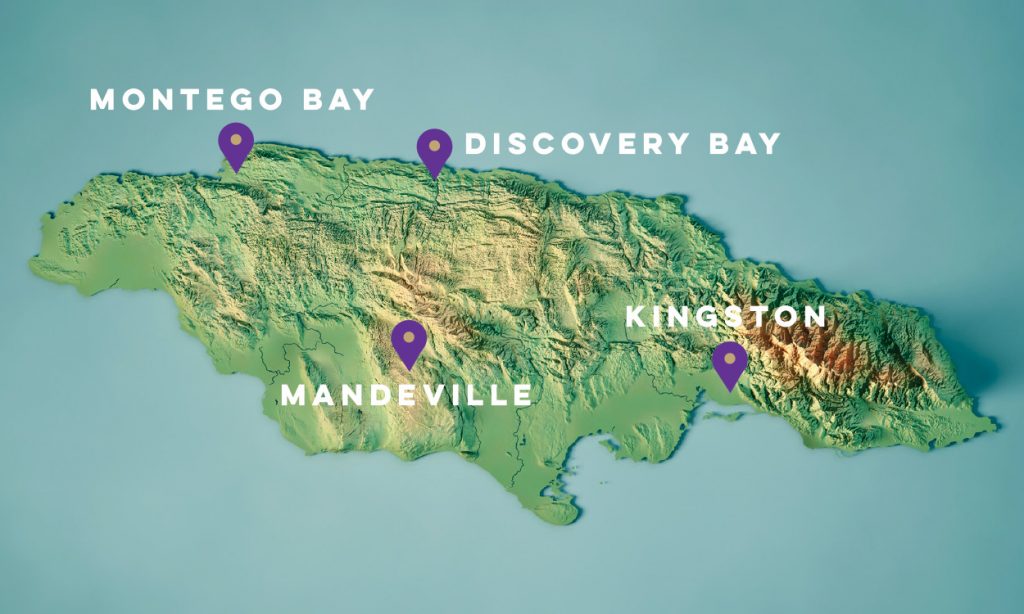 The Jamaica Program is offered through WCU’s College of Education and Allied Professions
and WCU’s Division of Educational Outreach, and coordinated through the Jamaican Ministry
of Education, Youth and Information. Since 1973, WCU has awarded 2,040 bachelor’s
degrees and 393 master’s degrees through the Jamaica Program. In October, it is expected
another 75 or so degrees will be presented, with about 25 being master’s degrees in
education.
The Jamaica Program is offered through WCU’s College of Education and Allied Professions
and WCU’s Division of Educational Outreach, and coordinated through the Jamaican Ministry
of Education, Youth and Information. Since 1973, WCU has awarded 2,040 bachelor’s
degrees and 393 master’s degrees through the Jamaica Program. In October, it is expected
another 75 or so degrees will be presented, with about 25 being master’s degrees in
education.
Teneisha Myers-Ferguson ’13 MAEd ’16 is a Jamaican educator from Portmore (a town located about 15 minutes from Kingston) who entered the bachelor’s degree program in May 2011 upon the recommendation of a colleague. “All the courses I have taken have propelled me on my journey as an educator. WCU has very knowledgeable lecturers who take the time out to facilitate meaningful encounters with us to be better educators to meet the needs of our students,” Myers-Ferguson said.
After earning her bachelor’s degree from WCU, Myers-Ferguson decided to pursue her master’s degree at WCU as well. “The experience has been amazing, which I know has helped me to obtain my current job as a contract inspector with the National Education Inspectorate,” she said. “The supervision courses are in-depth and analytical. Some of the best professors work at WCU. They continue to do a remarkable job to help other persons realize their full potential.”
As an education inspector, Myers-Ferguson goes out with a team to review aspects of the operations of public schools, assessing standards established for both primary and high schools. She reviews how well each school is led and managed; how effectively the teaching translates to the students’ learning; how well students perform in national and/or regional tests; and the level of the students’ personal and social development. The team also evaluates how well school administrators ensure everyone’s safety, security, health and well-being.
The Jamaica Program is self-supporting, with all costs covered by out-of-state tuition and fees paid by the Jamaican teachers. The baccalaureate program is designed to meet the learning needs of teachers in Jamaica, with concentrations in special education and early childhood, and a focus on mathematics. A master’s degree for school administrators in educational supervision is offered for those wanting to become principals or work in other leadership roles. The program has a requirement for summer residency in Cullowhee, with WCU welcoming Jamaican teachers to campus since the 1980s. This year, more than 70 teachers are expected to come to the Jackson County campus for the final course work for their degree.
“WCU gains as much as Jamaica,” said Susan Fouts ’78 MBA ’90, executive director of the Division of Educational Outreach. “That’s my observation from my engagement with the program. Our faculty are able to have a true international experience by teaching in a Jamaican classroom.”
The classrooms are not ‘electronic’ classrooms like the faculty members are accustomed to, Fouts said. Educational Outreach provides equipment, which faculty members will often set up and take down each night, she said. The faculty members also visit at least one classroom while in Jamaica. Those classrooms may have 45 students in a first-grade class without a teacher assistant, Fouts said. The visits help WCU faculty members “stretch” the classroom content and methodology for teachers who teach in this type of environment.
“My initial impression was how generous and hospitable the teachers are,” said Fouts, who made her first trip to Jamaica in 2006 to present at an international conference sponsored by the Jamaican Ministry of Education. “Whenever you visit a school, the principal will offer you both food and beverage almost immediately. This is similar to traditional Appalachian hospitality. The level of ingenuity and innovation was also a first impression. At one school, the principal advocated to the local mining company to provide internet connectivity to the entire community, and it happened. I also was impressed by the immersion of the performing arts into the learning activities in the schools. Math and language skills are taught with songs, skits, poems and stories. My first visit helped me to understand the infrastructure so much better.”
Beth Tyson Lofquist ’78 MAEd ’79 EdS ’88 echoed that sentiment. A retired WCU faculty member and academic administrator from Sylva, Lofquist has taught at all four WCU instructional sites over the past 24 years and remains active in the program. “I can honestly say that while I hope I contribute to the improvement of the educational system and the lives of Jamaican teachers I teach, I gain so much more than I give. Through being accepted and embraced by a proud people who are willing to open up to me, as a foreigner, we have learned together how to deal with the educational issues we face,” she said.
“Through my Jamaican experiences, I have learned that there is still pride in the midst of poverty, there is resourcefulness where resources are limited and there is a thirst for knowledge and a passion for intellectual banter that is refreshing to experience,” Lofquist said.
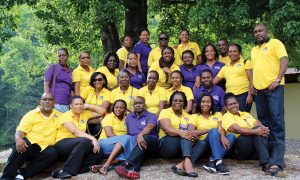
Students in the Jamaica Program spend time each summer on campus and visiting locations throughout the region.
Another common feeling among participants is how the program is a partnership and shared motivator for educational achievements and personal and professional fulfillment. “My involvement with Jamaican educators has been the most fulfilling experience I have had in the many decades I have spent in the field of education,” said Tom Oren, WCU associate professor of special education. “Our interactions have always been reciprocal around both teaching and learning, with large doses of humor and mutual respect. What they have instilled in me is a deeper understanding of what perseverance and resilience looks like every day, which for me, is humbling. What a blessing it has been to be at this wonderful university that has been steadfast in its support of these educators.”
The Jamaica Program affords teachers the opportunity to be at home, with their families and in their communities, for most of the curriculum. WCU instructs 35 of the required 40 credit hours to qualify for each degree in Jamaica, with the five remaining credits completed during the summer residency on the WCU campus.
Debbie Hamilton-Bogues ’99 MAEd ’01, from Hope Bay, Jamaica, is now an educator on an international level, which she credits to the Jamaica Program. “These degrees have had a significant impact on my career path and life,” Hamilton-Bogues said. “As a result, I was able to work with and manage departments with students with special needs. Having English as my first teacher training, I was employed as the English and literacy coordinator in a special needs provision in the United Kingdom.” She currently is working as the head of inclusion in a school in the United Arab Emirates, and she credits her special education degree from WCU for making it possible.
“I am really happy that I took the opportunity to study at WCU,” Hamilton-Bogues said. “It has helped to shape my life and has made a marked difference to where I could have been and where I am. It has projected me in a whole new world.”
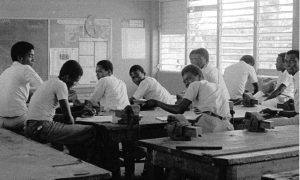 This relationship between a Southern Appalachian university and an island nation has
its own unique origins, with overlapping strands of history connecting to create the
Jamaica Program. Much of it began during the global tumult of 1968, as Alexander Pow
was beginning his term as WCU president. Upon installation, Pow immediately began
encouraging a broader worldview and increased international engagement from the Cullowhee
institution.
This relationship between a Southern Appalachian university and an island nation has
its own unique origins, with overlapping strands of history connecting to create the
Jamaica Program. Much of it began during the global tumult of 1968, as Alexander Pow
was beginning his term as WCU president. Upon installation, Pow immediately began
encouraging a broader worldview and increased international engagement from the Cullowhee
institution.
As a result of Pow’s encouragement, along with his own personal and professional interests, WCU professor Stanton Proctor undertook service as a co-director of the Caribbean Curriculum Development Project, a nonprofit push to improve Central American and Caribbean public and parochial schools. Proctor’s counterpart, Aubrey Phillips, a professor at the University of the West Indies in Kingston, readily sought contributions through the project’s international participants, especially those from WCU. When WCU hosted the Conference on Human Rights and International Education the following year, Phillips was invited to be keynote speaker, further cementing the island and mountain relationship.
Also in 1968, Burton Fox (who would later serve as director of WCU’s programs in the Caribbean and Latin America) took the crucial first steps to support an educational outreach program in Jamaica. As a young man, Fox had served in U.S.-sponsored overseas schools in numerous capacities. He supported the WCU president’s vision for the university to have more professors involved in global perspectives, send more WCU students to study abroad and attract more international students to Cullowhee to promote a more multicultural campus. Importantly, Fox had the connections and experience to help establish these goals, and was soon to lead the Inter-Regional Center, a supportive association for educational consultative services and staff development in Mexico, South America and the Caribbean. Fox is now retired and lives in Tuscaloosa, Alabama.
The timing was right, too. Jamaica was starting to reform school management, improve curriculum and set accreditation criteria. Enrollment in primary and middle grades was dramatically increasing. By 1970, WCU student teachers and faculty spent the winter quarter providing instruction, starting an evolution of assisting in educational development. By 1974, the Jamaica Program was formally established as a university offering.
As WCU professors began teaching through the program, they often found they had to adjust their lesson plans to meet the specific needs of future Jamaican teachers, said Ellie Blair, associate professor in the WCU School of Teaching and Learning.
“I had prepared to teach an introductory education class that I typically taught in Cullowhee, but within minutes of meeting these wonderful students, I knew that I needed to start all over building a course that would be relevant to these teachers and their schools and classrooms,” Blair said of her first trip to Montego Bay in 1993. “After my first class, I sat up most of the night rethinking what I would teach in Jamaica. I was completely unsettled by both the cultural and social differences that I encountered, and yet, this was the beginning of a love affair with Jamaica that has only grown stronger as the years have passed.
“I began to truly understand the experience of being both teacher and learner. I had so much to learn about a culture and a group of people where I was the visitor, the stranger, the other,” she said.
Blair has been involved in the Jamaica Program for 25 years and has lost track of how many times she’s visited. She has worked with WCU colleagues in schools across the island and conducts research with faculty at the University of the West Indies. “My work in Jamaica has been some of the most important work that I have done at Western Carolina University, and I am deeply grateful for the opportunity to be a part of our program in that country,” Blair said. “I can only hope that I have given as much to Jamaica as it has given to me.”
Iva Bailey, a native Jamaican and former school administrator, is WCU’s Jamaica Program onsite coordinator. He has been at his job for 25 years and now is looking toward semi-retirement. His career has been varied in duties, including once making arrangements for the Smoky Mountain Brass Quintet, made up of WCU School of Music faculty, to undertake a seven-day tour of Jamaican schools in 2012.
“The benefit of Western Carolina University to Jamaica is tremendous because we are seeing better-prepared teachers,” said Bailey. “The knowledge that these teachers get after two years of study with WCU is a tremendous asset to the classroom and, on a broader scale, to the country.”
WCU held special commencement exercises in Jamaica in March 1986, when 61 students made history as the first Jamaicans to be graduated in their homeland by an American university. According to major American educational associations, it also was the first time any American university had held an overseas commencement. The first master’s degrees were awarded in 2002. In 2003, the Jamaican graduation ceremonies included an honorary doctorate bestowed upon Sir Howard Cooke, then-governor-general of Jamaica and a pivotal figure in the country’s history as a statesman when the Caribbean island nation declared its independence from British rule in 1962. A former minister of education, Cooke helped build the Jamaican system of education and was another pivotal figure in strengthening connections with WCU.
“These highly impactful programs have changed the lives of many, both here on campus and in Jamaica,” said Alison Morrison-Shetlar, WCU interim chancellor. “It is a joy to preside over the graduations in Jamaica each year and to celebrate not only the attainment of a degree but the impact on the community in which the students live and work. Our WCU students from Jamaica are an inspiration to their families and students and are giving back to their communities the legacy of an education. I could not be more proud of the faculty and staff who dedicate their time and talent in support of these students and to the students who represent the values of WCU so well.”
